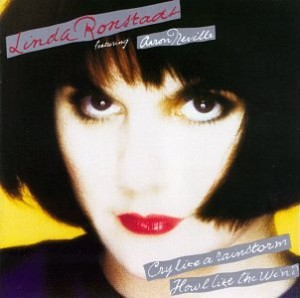
"Cry Like A Rainstorm, Howl Like The Wind" (1989) Was The One And Only Pop Album Linda Ronstadt Released In The '80s. Aaron Neville Sang With Her In More Than Half The Cuts, Including The Hits “Don’t Know Much” And “All My Life”.
Linda Ronstadt always had little use for the trappings of fame. She loved to sing. That was it. In the ’70s, she found a hit-making formula that let her became the highest-paid woman in the history of rock up to that time. But Linda didn’t want the sheer attention and the loss of privacy that has always been part of the whole shebang. And in the early ’80s, the Tucson-born singer said goodbye to it all for the best part of the decade.
She was to star in Broadway musicals (including “The Pirates Of Penzance” and “La Boheme”), record two albums of Mexican songs, and release three albums of standards. None of these even approached her commercial pinnacle. And that was just fine by her. A course like the one she embarked on in the ’80s let Linda distance herself from a scene that she simply saw as not nurturing. And that very same distancement was what let her release one of the most accessible pop albums of her career as the decade was coming to an end. The sights were simply not on her when that happened. People listened to her sing that time. There was no longer anything to prove to anybody. It was just Linda and her voice.
The year was 1989, and the album went by the name of “Cry Like A Rainstorm, Howl Like The Wind”. It was largely a collaboration with Aaron Neville, the New Orleans musician best known for shooting to the top of the charts in 1967 with the song “Tell It Like It Is”. The album gave Linda and Aaron a Top 2 hit in “Don’t Know Much”, and a Top 11 entry in the striking “All My Life”, a song bristling with so many emotions that nobody could distill all of them without having to come to terms with a good couple of home truths in the process. It is easily my favorite song on the record. And the runner up is undoubtedly “Adiós”. Its got everything going for it: an achingly lush orchestral arrangement, Brian Wilson on backing vocals, some truly scorching choruses…
It is not the only valedictory number on the record, mind you – the set closer is “Goodbye My Friend”. It is not bad, but it barely gets off the starting line while “Adiós” is already acknowledging the crowd’s ovation. Continue reading
